北师大版(2019)选择性必修 第一册Unit 3 Conservation Lesson 3 The Road to Destruction课件(共20张PPT)择性必修第一册
文档属性
| 名称 | 北师大版(2019)选择性必修 第一册Unit 3 Conservation Lesson 3 The Road to Destruction课件(共20张PPT)择性必修第一册 | 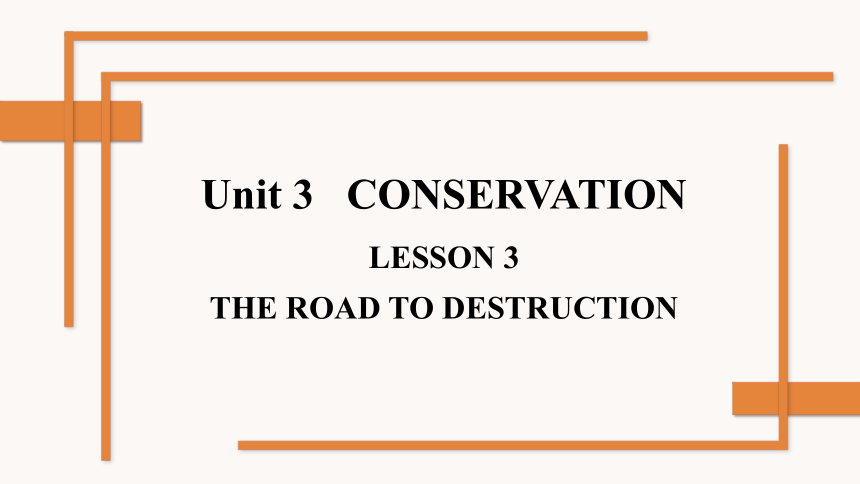 | |
| 格式 | pptx | ||
| 文件大小 | 1.0MB | ||
| 资源类型 | 教案 | ||
| 版本资源 | 北师大版(2019) | ||
| 科目 | 英语 | ||
| 更新时间 | 2024-04-25 21:32:42 | ||
图片预览

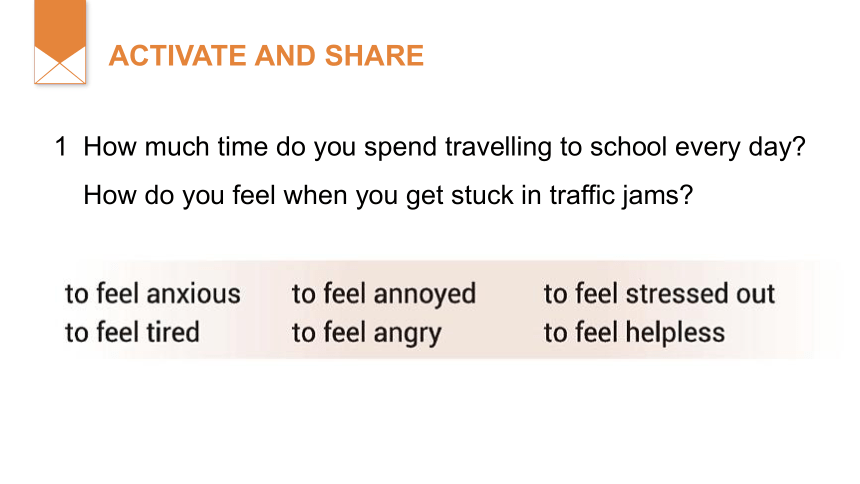


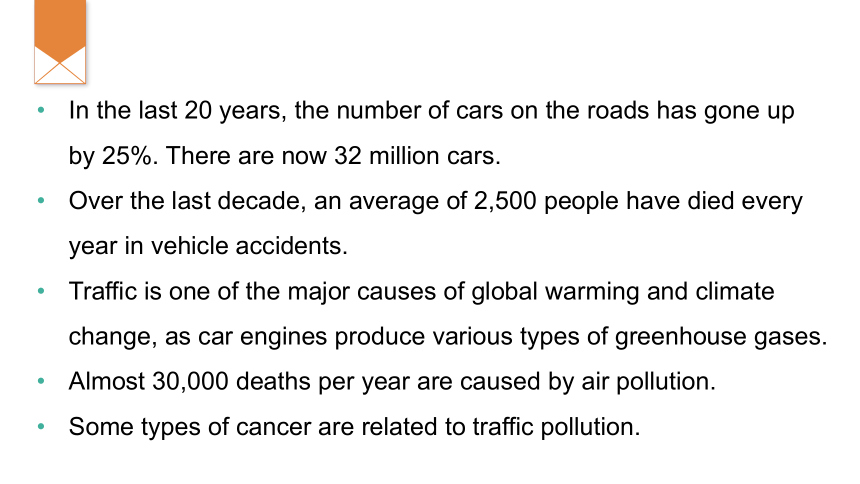
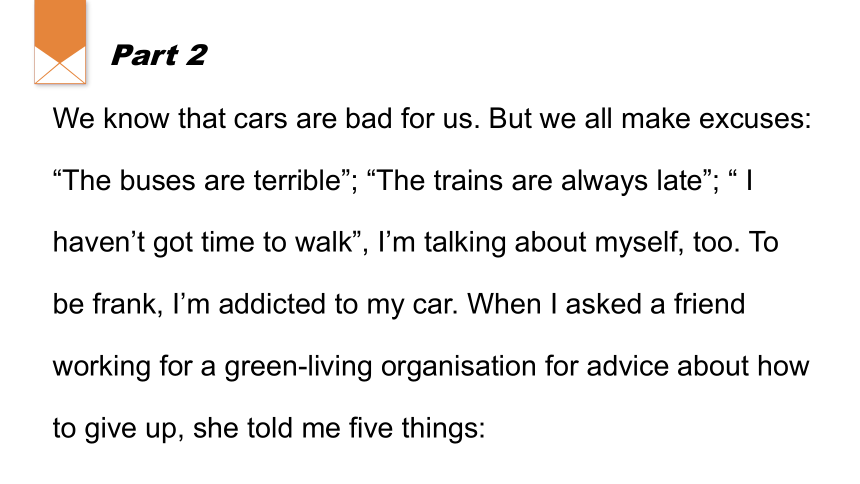
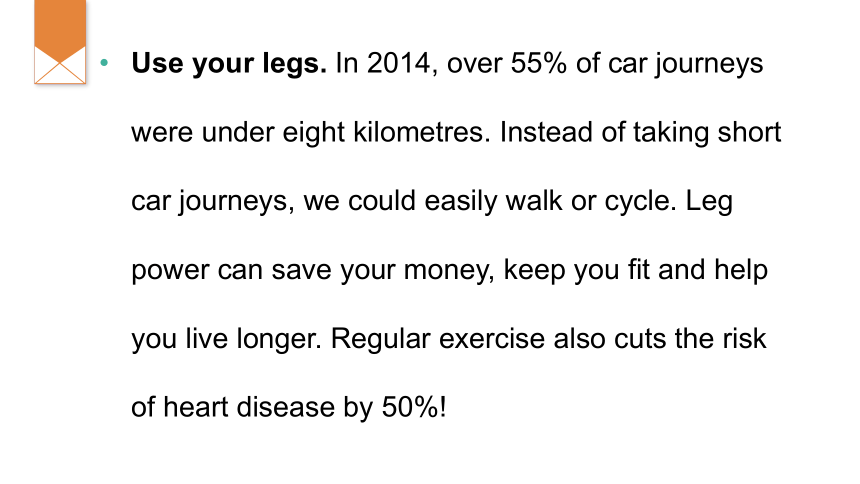

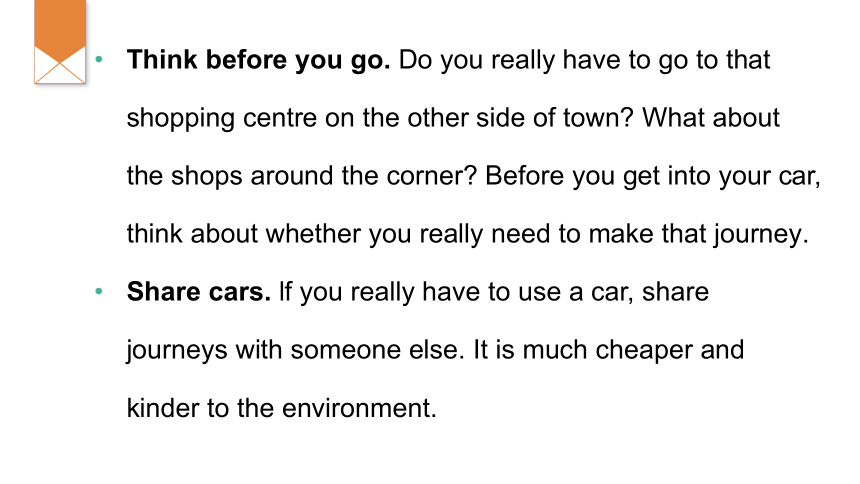
文档简介
(共20张PPT)
Unit 3 CONSERVATION
LESSON 3
THE ROAD TO DESTRUCTION
1 How much time do you spend travelling to school every day
How do you feel when you get stuck in traffic jams
ACTIVATE AND SHARE
READ AND EXPLORE
2 Below is a passage about car uses in Britain. Guess the answers to the questions before you read the passage.
How many cars are there on the roads
32 million / 50 million / 64 million
By how much has the number of cars gone up in the last 20 years
10% / 25% / 40%
How many people die every year in vehicle accidents
1,000 / 2,500 / 3,000
How many deaths per year are caused by air pollution
10.000 / 20.000 / 30.000
3 Read Part 1 of the passage. Check your predictions in Activity 2.
Part 1
“This morning, it took me 40 minutes to go downtown. More roadworks on the A10!”
“Oh really lt took me over an hour. There was an accident on the M11.”
How often have you heard these conversations How often do we get stuck in traffic jams How often do we arrive at work or school, stressed out, tired and angry For many people, the answer is every day. But personal anger and stress are nothing compared to the real costs socially. Here are some figures about Britain:
In the last 20 years, the number of cars on the roads has gone up by 25%. There are now 32 million cars.
Over the last decade, an average of 2,500 people have died every year in vehicle accidents.
Traffic is one of the major causes of global warming and climate change, as car engines produce various types of greenhouse gases.
Almost 30,000 deaths per year are caused by air pollution.
Some types of cancer are related to traffic pollution.
Part 2
We know that cars are bad for us. But we all make excuses: “The buses are terrible”; “The trains are always late”; “ I haven’t got time to walk”, I’m talking about myself, too. To be frank, I’m addicted to my car. When I asked a friend working for a green-living organisation for advice about how to give up, she told me five things:
Use your legs. In 2014, over 55% of car journeys were under eight kilometres. Instead of taking short car journeys, we could easily walk or cycle. Leg power can save your money, keep you fit and help you live longer. Regular exercise also cuts the risk of heart disease by 50%!
Use public transport. Up to 90 people can travel in one bus, while the same number will need at least 18 cars. Sometimes it can take a little bit longer, but so what You can relax, read a book, talk to someone - who knows
Think before you go. Do you really have to go to that shopping centre on the other side of town What about the shops around the corner Before you get into your car, think about whether you really need to make that journey.
Share cars. lf you really have to use a car, share journeys with someone else. It is much cheaper and kinder to the environment.
Take action! We often think there is nothing we can do about the noise, pollution and danger of traffic, There is. If your street is full of heavy traffic, talk to your neighbours about it, Write to the papers, Go to the city government. Ask for a speed limit. Do whichever of these things that suit you. Don’t just sit around and complain!
All quite simple, isn’t it Five easy ways to improve our environment. Well, I’m sorry I have to finish this article, but I’ve got to pick up my daughter from school at 4 pm. Then l’ve got to drive to the supermarket to do the shopping. After that, l have to take my son to a party. The traffic is going to be horrible, but what can l do
4 Read Part 1 more carefully. Complete the notes in the diagram.
Then think about any possible solutions to the problems.
stressed out; tired
vehicle accidents; global warming and climate change; air pollution; cancer related to traffic pollution
5 Read Part 2 and complete the notes.
use public transport
think before you go;
share cars
take action
6 Pair Work Talk about the effects of traffic problems at the personal and social level, as well as the solutions proposed. Then discuss whether the solutions will help solve the problem. Give your reasons, Use the notes in Activities 4 and 5 to help you.
7 Group Work Think and share.
1 What is the writer’s attitude towards cars
Find some evidence from the passage.
2 How do you understand the title “The Road to Destruction”
FOCUS ON LANGUAGE: COLLOCATIONS (2)
8 Look at the Word Builder. Match the words (1-8) with the endings (a-h) to form common collocations. Then use the collocations to complete the summary.
Many people often 1______________________ when they go to work. How annoyed and stressed they often feel! But the problem is that the number of cars is still going up. Traffic pollution has been found to 2 __________________ and climate change to a large degree.
Too many cars 3 __________________ to the environment and our health. Some advice has been given for people to help 4 _____________________, for example, using public transport or 5____________, doing your shopping in the shop just around the corner instead of driving to the other side of town. However, people 6_____________ using cars. They 7_________________ for using their cars, “l need to 8 _____________ my daughter. What can l do ”
get stuck in a traffic jam
cause global warmnng
do a lot of harm
protect the environment
sharing cars
are addicted to
make excuses
pick up
EXPRESS YOURSELF
9 Make a poster based on what you have learnt to encourage people in your neighbourhood to use their vehicles wisely. Search for facts and data to make your poster convincing. Then share your work in groups.
完成课后相关练习
谢谢观看
Unit 3 CONSERVATION
LESSON 3
THE ROAD TO DESTRUCTION
1 How much time do you spend travelling to school every day
How do you feel when you get stuck in traffic jams
ACTIVATE AND SHARE
READ AND EXPLORE
2 Below is a passage about car uses in Britain. Guess the answers to the questions before you read the passage.
How many cars are there on the roads
32 million / 50 million / 64 million
By how much has the number of cars gone up in the last 20 years
10% / 25% / 40%
How many people die every year in vehicle accidents
1,000 / 2,500 / 3,000
How many deaths per year are caused by air pollution
10.000 / 20.000 / 30.000
3 Read Part 1 of the passage. Check your predictions in Activity 2.
Part 1
“This morning, it took me 40 minutes to go downtown. More roadworks on the A10!”
“Oh really lt took me over an hour. There was an accident on the M11.”
How often have you heard these conversations How often do we get stuck in traffic jams How often do we arrive at work or school, stressed out, tired and angry For many people, the answer is every day. But personal anger and stress are nothing compared to the real costs socially. Here are some figures about Britain:
In the last 20 years, the number of cars on the roads has gone up by 25%. There are now 32 million cars.
Over the last decade, an average of 2,500 people have died every year in vehicle accidents.
Traffic is one of the major causes of global warming and climate change, as car engines produce various types of greenhouse gases.
Almost 30,000 deaths per year are caused by air pollution.
Some types of cancer are related to traffic pollution.
Part 2
We know that cars are bad for us. But we all make excuses: “The buses are terrible”; “The trains are always late”; “ I haven’t got time to walk”, I’m talking about myself, too. To be frank, I’m addicted to my car. When I asked a friend working for a green-living organisation for advice about how to give up, she told me five things:
Use your legs. In 2014, over 55% of car journeys were under eight kilometres. Instead of taking short car journeys, we could easily walk or cycle. Leg power can save your money, keep you fit and help you live longer. Regular exercise also cuts the risk of heart disease by 50%!
Use public transport. Up to 90 people can travel in one bus, while the same number will need at least 18 cars. Sometimes it can take a little bit longer, but so what You can relax, read a book, talk to someone - who knows
Think before you go. Do you really have to go to that shopping centre on the other side of town What about the shops around the corner Before you get into your car, think about whether you really need to make that journey.
Share cars. lf you really have to use a car, share journeys with someone else. It is much cheaper and kinder to the environment.
Take action! We often think there is nothing we can do about the noise, pollution and danger of traffic, There is. If your street is full of heavy traffic, talk to your neighbours about it, Write to the papers, Go to the city government. Ask for a speed limit. Do whichever of these things that suit you. Don’t just sit around and complain!
All quite simple, isn’t it Five easy ways to improve our environment. Well, I’m sorry I have to finish this article, but I’ve got to pick up my daughter from school at 4 pm. Then l’ve got to drive to the supermarket to do the shopping. After that, l have to take my son to a party. The traffic is going to be horrible, but what can l do
4 Read Part 1 more carefully. Complete the notes in the diagram.
Then think about any possible solutions to the problems.
stressed out; tired
vehicle accidents; global warming and climate change; air pollution; cancer related to traffic pollution
5 Read Part 2 and complete the notes.
use public transport
think before you go;
share cars
take action
6 Pair Work Talk about the effects of traffic problems at the personal and social level, as well as the solutions proposed. Then discuss whether the solutions will help solve the problem. Give your reasons, Use the notes in Activities 4 and 5 to help you.
7 Group Work Think and share.
1 What is the writer’s attitude towards cars
Find some evidence from the passage.
2 How do you understand the title “The Road to Destruction”
FOCUS ON LANGUAGE: COLLOCATIONS (2)
8 Look at the Word Builder. Match the words (1-8) with the endings (a-h) to form common collocations. Then use the collocations to complete the summary.
Many people often 1______________________ when they go to work. How annoyed and stressed they often feel! But the problem is that the number of cars is still going up. Traffic pollution has been found to 2 __________________ and climate change to a large degree.
Too many cars 3 __________________ to the environment and our health. Some advice has been given for people to help 4 _____________________, for example, using public transport or 5____________, doing your shopping in the shop just around the corner instead of driving to the other side of town. However, people 6_____________ using cars. They 7_________________ for using their cars, “l need to 8 _____________ my daughter. What can l do ”
get stuck in a traffic jam
cause global warmnng
do a lot of harm
protect the environment
sharing cars
are addicted to
make excuses
pick up
EXPRESS YOURSELF
9 Make a poster based on what you have learnt to encourage people in your neighbourhood to use their vehicles wisely. Search for facts and data to make your poster convincing. Then share your work in groups.
完成课后相关练习
谢谢观看
同课章节目录
- Unit 1 Relationshis
- Lesson 1 Teachers
- Lesson 2 How Do We Like Teachers’ Feedback?
- Lesson 3 So Close,Yet So Fa
- Unit 2 Success
- Lesson 1 Money vs Success
- Lesson 2 Top Five Secrets of Success
- Lesson 3 Getting to the Top
- Unit 3 Conservation
- Lesson 1 The Sixth Extinction
- Lesson 2 War on Plastic Packets
- Lesson 3 The Road to Destruction
